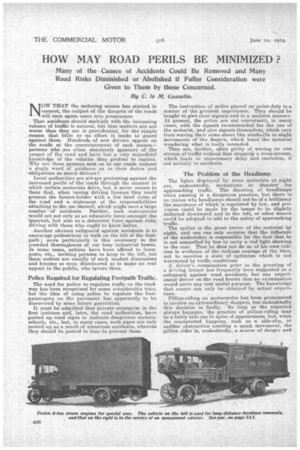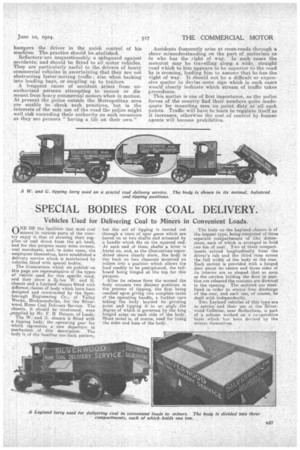HOW MAY ROAD PERILS BE MINIMIZED?
Page 12

Page 13

If you've noticed an error in this article please click here to report it so we can fix it.
Many of the Causes of Accidents Could Be Removed and Many Road Risks Diminished or Abolished if Fuller Consideration were Given to Them by those Concerned.
By C. le M. Gosselin.
NOW THAT the motoring season has started in earnest, the subject of the dangers of the roads will once again come into prominence. That accidents should multiply with the increasing volume of traffic is natural, but that matters are not worse than they are is providential, for the simple reason that little or no effort is made to guard against them. Hundreds of new drivers appear on the roads at the commencement of each season— persons who are often absolutely ignorant of the usages of the road and have but a very superficial knowledge of the vehicles they profess to control. Why are these persons sent on to our roads without a, single word of guidance as to their duties and `obligations as motor drivers?•
Local authorities are always protesting against the increased perils of the roads through the manner in which certain motorists drive, but it never occurs to them that, when issuing driving licences they could present the licence holder with a few brief rules of the road and a statement of the responsibilities attaching to the use thereof, which might save a large number ' of accidents. Further, such instructions would act not only as an educative force amongst the ignorant, but also as a deterrent force against risky driving with those who ought to know better.
Another obvious safeguard against accidents is to encourage pedestrians to walk on the left of the footpath; more particularly is this necessary in the crowded thoroughares of our busy industrial towns. In some cases, notices have been affixed to lampposts, etc., inviting persons to keep to the left, but these notices are usually of such modest dimensions and become so soon discoloured as to make no real appeal to the public, who ignore them.
Police Required for Regulating Footpath Traffic.
The need for police to regulate traffic on the roadway has been recognized for some considerable time, but the idea of using police to regulate the footpassengers on the pavement has apparently to be discovered by some future generation.
It must be admitted that private enterprise in the first instance and, later, the road authorities, have posted up road signs to indicate dangerous corners, schools, etc., but, in many eases, such signs are only posted up as a result of numerous accidents, whereas they should be posted in time to prevent them. The instruction of police placed on point-duty is a Matter of the greatest impertanee. They should be taught to give clear signals and in a uniform manner. At present, the 'police are not Conversant, in many, eases, with the signals recommended for the use of the motorist, and give signals themselves, which vary from waving their aims about like, windmills to slight movements of the fingers, which leave the motorist wondering what is really intended.
They are, further, often guilty of waving on one stream of traffic without first stoppini a cross-stream, which leads to unnecessary delay and confusion, if not actually to accidents.
The Problem of the Headlamp.
The lights displayed by some motorists at night .are, undoubtedly, invitations to disaster for approaching traffic. The dimming of headlamps when passing is a dangerous practice, but there is no reason why headlamps should not be of a brilliancy the maximum of which is regulated by law, and pr vision could he made for the lamps to l o e slightly . deflected downward and to the left, or other means could be adopted to add to the safety of approaching traffic.
The cyclist is the great terror of the motorist by night, and one can only surmise that the influence of the undertaker is responsible for the fact that he is not compelled by law to carry a red light showing to the rear. That he does not do so of his own volition is evidence of the reckless courage of the race, not to mention a state of optimism which is not warranted by traffic conditions. A driver's, examination prior to the granting of a driving licence has frequently been suggested as a safeguard against road accidents, but any experienced driver on the road knows that no examination would serve any real useful purpose. The knowledge that counts can only be obtained by actual experience.
Pillion-riding on motorcycles has been pronounced to involve no extraordinary dangers, but undoubtedly this decision is faulty. So long as the expected always happens, the practice of pillion-riding may be a fairly safe one in spite of appearances, but, when the unexpected happens, such as a side-slip, or sudden obstruction needing a quick movement, the pillion rider is, undoubtedly, a source of danger and. hampers the driver in the quick control of his machine. The practice should be abolished.
Reflectors are unquestionably a safeguard against accidents, and should be fitted to all motor vehicles. They are particularly useful to the drivers of heavy commercial vehicles in ascertaining that they are not obstructing faster-moving traffic ; also when backing into loading bays, or coupling up to trailers. A frequent cause of accident arises from unauthoriz,ed persons attempting to mount or dismount from heavy commercial motors when in motion. At present the police outside the Metropolitan area are unable to check such practices, but in the interests of the safe use of the road the police might well risk exceeding their authority on such occasions as they see persons " haviog a lift on their awn."
Accidents frequently arise at cross-roads through a sheer misunderstanding on the part of motorists as to who has the right of way: In such cases the motorist may be travelling along a wide, straight road which to him appears to be superior to the road he is crossing, leading him to assume that he has the right of way. It should not be a difficult or expensive matter to devise some sign which in such cases would clearly indicate which stream of traffic takes precedence.
This matter is one of first importance, as the police forces of the country find their numbers inade quate quite for mounting men on point duty at all such points. Traffic will have to learn to regulate itself as it increases, otherwise the cost of control by human agents will become prohibitive.
































